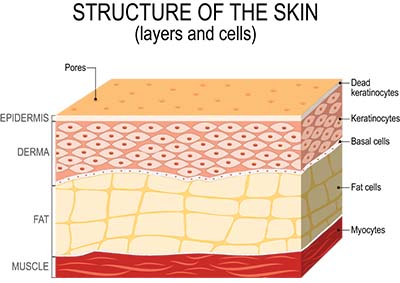As people alive in this world, we don’t often think about what happens to a human body once a person passes away until we are faced with the reality of it. For those who do come across a body because a loved one passed away or they come across one while on a river or on a trail, they may experience sights previously unknown. One of these sights most apparent is called “skin slippage.” Skin slippage on a human body can look abnormal but on a cadaver in the decomposition process, skin slippage is perfectly normal.
The skin slippage process
Skin slippage is a part of the decomposition process when the top layers of skin become disconnected from layers below and can, therefore, “slip” off the body. Taking place relatively early in the process, it happens through a process when enzymes are released and cells holding layers of skin together start to rupture forming what looks like blisters, leaving a sticky surface behind. As the epidermis layer of skin separates from the dermis layer, these superficial layers can then start sloughing off or peeling away. Where this happens on the body can vary greatly but it is particularly common for the skin to first detach on the hands and feet where skin can be removed like a sock or glove cast off and no longer needed.

Many factors speed up or slow down the process
This part of the body decomposition process can vary greatly in speed and appearance depending on many factors around and inside the body. Once the skin has started slipping away, it can look like bubbles on the skin, a bad sunburn where you can peel the skin away, or like melted wax over the skeletal structure. Factors include:
- Surrounding temperature: The warmer and more humid an environment is around the body, the faster the skin will detach from the rest of the body. In high humidity, this can take place in 2-3 days. If it is cold, the whole decomposition process takes much longer, and skin will stay connected for a longer period of time. This is why cadavers are often refrigerated after death: it slows down the decomposition process while burial arrangements are made or cremation can take place.
- Size and weight of the body: The condition of the cells in the skin and how large or small a person is when they pass away can speed up or slow down the skin slippage process to a degree.
- Clothing worn at time of death: If a person has layers of clothing on at the time of death, there are fewer areas of skin exposed to the elements that would speed up the process. The more skin that is exposed to the soil beneath with all the bacteria in that soil, the faster skin slippage will occur.
- Weather and climate: Skin slippage will occur far faster and more evenly with more moisture in the air. If the surrounding weather is dry, the entire process, including skin slippage, will take far longer.
When a dead body is found in water
When a dead body is submerged in water while it decomposes, skin slippage takes place in around 24 hours. With water soaking through the top layers of skin, the cells holding the layers together separate far faster, letting in more bacteria into the rest of the body to aid in decomposition. This is one of the reasons a body found in a lake or river can be so unrecognizable so quickly—the water speeds the whole process along.
Unattended Death Cleanup
If you’re working on handling the cleanup after an unattended death where a body has decomposed on a property for a time, our team at Bio SoCal has the experienced and compassionate biohazard cleanup services you need. From large jobs to small, we understand what it takes to make sure all bodily fluids are fully removed and body tissues safely and legally disposed of. After removing all biohazards, we then carefully clean, sanitize, and disinfect all the surfaces, nooks, and crannies, so you can rest assured the property is safe and all lingering odor is permanently removed. As most property insurance policies cover our work, we’ll even document the damage and file the claim on your behalf. We are here to make a difficult time as easy as possible.
